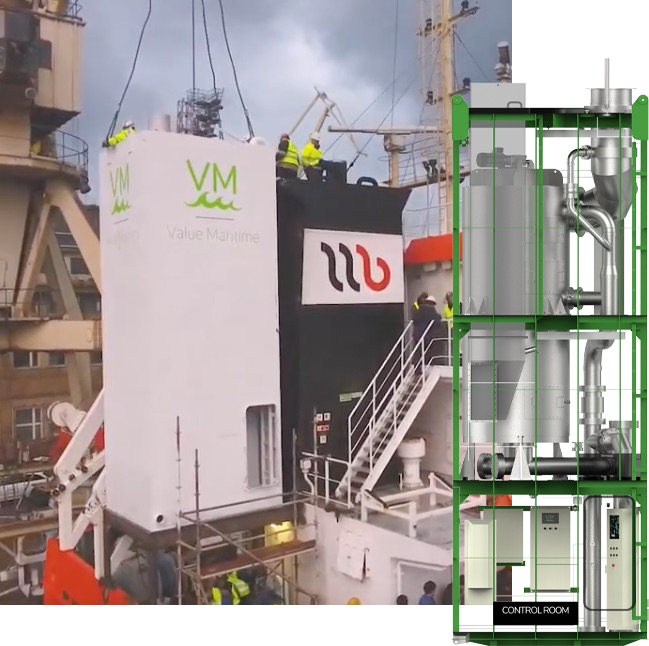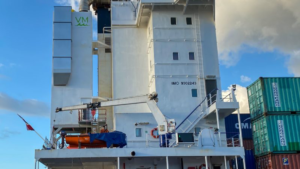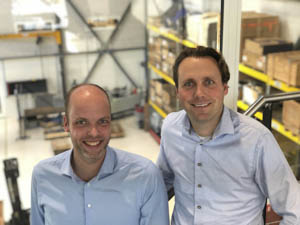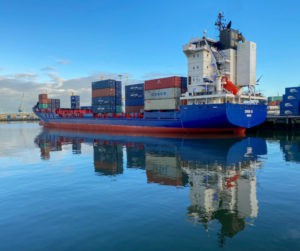FILTERSYSTEEM
We were interviewed by Nieuwsblad Transport and want to share a translation of the interview with you below.
For more information on our system checkout our product page or download our product leaflet.

Shipowners don’t want expensive scrubbers
As of this year, shipowners are obliged worldwide to reduce the sulfur emissions from their ships sailing on bunker oil. The start-up Value Maritime has now developed a filter system for the oil-guzzling engines. Maarten Lodewijks, owner of the new company together with Christiaan Nijst, argues that their system solves a major problem for shipping.

What does Value Maritime’s “elevator pitch” look like?
Based on new technologies, we have developed an improved scrubber that not only removes sulfur from exhaust gases, but also ultra-fine particulate matter. The scrubber also ensures that the ph value is neutralized. In addition to lower CO2 emissions, this also results in a reduction in the acidification of the seawater. We clean the air and the sea.
What is your background?
My colleague Christiaan is the technical brain behind the reinvented scrubber technology. He has nearly a dozen years experience in various engineering and process roles at Shell, including as a strategy advisor to European refineries ahead of the IMO 2020 change. I myself am a financial expert with a solid background as a graduated economist. I completed my MBA Executive Program at Harvard Business School while working at shipping company Spliethoff, where I was responsible for corporate finance.
How do you know each other?
I’ve known Chris for almost 22 years. We used to come to the same barbecues. Although I did not come for Chris at the time, but for a girl who was always there. I was 16 and certainly not yet working on filter systems. But four years ago we decided to join forces and start a company together because we were convinced that scrubber technology for ships could be different and better. Chris focuses on process technology, I focus on financing, and we also brought in people from the shipping industry and good engineers.
How did you come up with the idea to develop such a filter system?
We saw a clear need to change shipping. Shipowners and their customers, public opinion: everyone wants sustainability. Legislation is also becoming stricter with regard to the greening of shipping; take the Green Deal. Greening is a good development, but it must be realized in such a way that all ships continue to sail in the meantime.
What is your ambition?
There are already eleven ships that are equipped with our filter system, but we want to go towards the hundreds, thousands. Where our sales currently mainly focus on the Netherlands, we want to expand to other countries, starting with Germany.
How do shipowners feel about the global obligation to reduce sulfur emissions from their oil and how does Value Maritime help them?
Shipowners are well aware of the need to improve the environment. But at the same time they have their hands in their hair: how are ship owners going to earn back the fuel costs? We respond to that. On the one hand, the focus is on greening and on the other, it is important to keep costs in check.
Because we monitor the systems, we see both the environmental impact and the savings we are making for shipowners. Customers notice the improvements of our system compared to professional scrubbers; for example, our system can easily be placed on a ship. We also offer various financing solutions.

Do you have any competitors?
Not so much a competitor. The big challenge is to ensure that the air is not polluted and the sea remains as clean as possible. In that respect, shipping is now really on a collision course to make this happen. There are companies that sell scrubbers, but they are based on old technology. No other company works the way we work with new technologies.
How did you get seed capital?
We have found five investors from the shipping industry, of whom we do not name any, willing to invest in Value Maritime.
Where will you be in two years?
We want to provide as many ships as possible with our installation, in the interest of the shipowner and the environment. We also want to make financing solutions for shipowners as suitable as possible. The system is capital intensive and it has to be paid for. And this is certainly important in these tough economic times.
And what is planned for the short term?
Build and deliver scrubbers. About once a month we deliver a scrubber and we will soon be moving towards one scrubber per week. If it hadn’t been for the corona crisis, we would probably be on it by now. And in the meantime we continue to innovate: making materials lighter, developing new filtration techniques, and making financing options as suitable as possible.
What lessons have you learned along the way?
We still learn every day. Also by installing the installations on the ships themselves. We learn from the team that is now sailing to make improvements for the future.
Company Name: Value Maritime
Platform Inception date: september 2017
Number of employees: 12
Volume: een filtersysteem per maand
Investment made: in de miljoenen
Article Source: Nieuwblad Transport, Nathalie van Herk, 25 September, 2020

Dutch Original version from the article in Nieuwsblad Transport:
‘Reders willen zich aan scrubbers niet scheel betalen’
Reders zijn sinds dit jaar wereldwijd verplicht om de zwaveluitstoot van hun op bunkerolie varende schepen te verminderen. De start-up Value Maritime heeft voor de olie slurpende motoren nu een filtersysteem ontwikkeld. Maarten Lodewijks, samen met Christiaan Nijst eigenaar van het nieuwe bedrijf, betoogt dat hun systeem een groot probleem voor de scheepvaart oplost.
Hoe ziet de ‘elevator pitch’ van Value Maritime eruit?
Op basis van nieuwe technologieën hebben we een verbeterde scrubber ontwikkeld die niet alleen zwavel uit uitlaatgassen haalt, maar ook ultrafijn fijnstof. Ook zorgt de scrubber ervoor dat de ph-waarde wordt geneutraliseerd. Behalve een lagere CO2-uitstoot wordt zo ook een reductie van de verzuring van het zeewater gerealiseerd. We verschonen de lucht én de zee.
Wat is jullie achtergrond?
Mijn collega Christiaan is het technisch brein achter de opnieuw uitgevonden scrubber-technologie. Hij heeft bijna een dozijn jaar ervaring in verschillende engineering- en procesfuncties bij Shell, onder meer als strategieadviseur voor de Europese raffinaderijen met het oog op de IMO 2020-verandering. Ikzelf ben een financieel expert met een gedegen achtergrond als afgestudeerd econoom. Ik voltooide mijn MBA Executive Program aan de Harvard Business School terwijl ik werkte bij rederij Spliethoff, waar ik verantwoordelijk was voor corporate finance.
Hoe kennen jullie elkaar?
Ik ken Chris al bijna 22 jaar. Vroeger kwamen we op dezelfde barbecues. Al kwam ik destijds niet voor Chris, maar voor een meisje dat daar ook altijd aanwezig was. Ik was 16 en zeker nog niet bezig met filtersystemen. Maar vier jaar geleden besloten we de krachten te bundelen en samen een bedrijf te starten omdat wij ervan overtuigd waren dat scrubber-technologie voor schepen anders en beter kon. Chris richt zich op de procestechnologie, ik op de financiering, en verder hebben we er mensen uit de scheepvaart en goede engineers bij gehaald.
Hoe zijn jullie op het idee gekomen om zo’n soort filtersysteem te ontwikkelen?
Wij zagen een duidelijke behoefte om de scheepvaart te verschonen. Reders en hun klanten, de publieke opinie: iedereen wil verduurzaming. Ook de wetgeving wordt strenger wat betreft de vergroening van de scheepvaart; neem de Green Deal. Vergroening is een goede ontwikkeling, maar moet wel op zo’n manier gerealiseerd worden dat alle schepen ondertussen blijven varen.
Wat is jullie ambitie?
Er varen nu al elf schepen die voorzien zijn van ons filtersysteem, maar we willen richting de honderdtallen, duizendtallen gaan. Waar onze verkoop zich nu nog vooral op Nederland richt, willen we uitbreiden naar andere landen, om te beginnen met Duitsland.
Hoe staan reders tegenover de wereldwijde verplichting om de zwaveluitstoot van hun olie te verminderen en hoe helpt Value Maritime hen?
Reders zijn zich wel degelijk bewust van de noodzaak van het verbeteren van het milieu. Maar tegelijkertijd zitten ze met hun handen in het haar: hoe gaan reders de brandstofkosten terugverdienen? Daar spelen wij op in. Aan de ene kant ligt de focus op vergroenen en aan de andere kant is het belangrijk om de kosten in toom te houden.
Doordat wij de systemen monitoren, zien we zowel de effecten op milieugebied als de besparingen die we realiseren voor reders. Klanten merken de verbeteringen van ons systeem ten opzichte van professionele scrubbers; ons systeem kan bijvoorbeeld makkelijk op een schip geplaatst worden. Ook bieden we verschillende financieringsoplossingen aan.

Hebben jullie concurrenten?
Niet zozeer een concurrent. De grote uitdaging is om ervoor te zorgen dat de lucht niet vervuild wordt en de zee zo schoon mogelijk blijft. Wat dat betreft is de scheepvaart nu echt op ramkoers om dat te realiseren. Er zijn wel bedrijven die scrubbers verkopen, maar die zijn gebaseerd op oude technologie. Zoals wij met nieuwe technologieën werken, werkt geen ander bedrijf.
Hoe zijn jullie aan startkapitaal gekomen?
We hebben een vijftal investeerders uit de scheepvaart, waarvan we geen namen noemen, bereid gevonden om te investeren in Value Maritime.
Waar staan jullie over twee jaar?
We willen zoveel mogelijk schepen voorzien van onze installatie, in het belang van de reder en het milieu. Ook willen we financieringsoplossingen voor reders zo goed mogelijk passend maken. Het systeem is kapitaalintensief en het moet toch ergens van betaald worden. En zeker in deze economische pittige tijd is dat van belang.
En wat staat er voor de korte termijn op de planning?
Scrubbers bouwen en leveren. Ongeveer een keer per maand leveren we een scrubber af en we gaan straks wel richting een scrubber per week. Als de coronacrisis er niet was geweest, zaten we daar waarschijnlijk nu al op. En we blijven ondertussen innoveren: het lichter maken van materialen, nieuwe filtratietechnieken ontwikkelen, de mogelijkheden van financiering zo passend mogelijk maken.
Welke lessen hebben jullie onderweg geleerd?
We leren nog elke dag. Ook door het installeren van de installaties op de schepen zelf. Van het elftal dat nu vaart, leren we om verbeteringen door te voeren voor de toekomst.
Bedrijfsnaam: Value Maritime
Oprichtingsdatum platform: september 2017
Aantal werknemers: 12
Volume: een filtersysteem per maand
Gedane investering: in de miljoenen
Article Source: Nieuwblad Transport, Nathalie van Herk, 25 September, 2020
For more information on our system checkout our product page or download our product leaflet.

